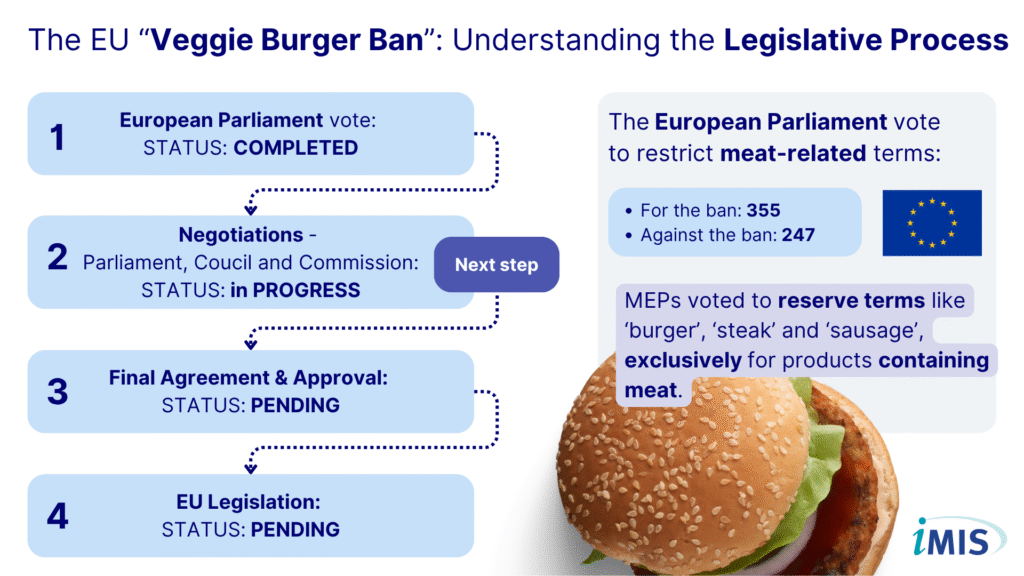Introduction
The EU Parliament has cast a pivotal vote. Lawmakers now want to ban meat-related terms for plant-based foods. The decision has created significant uncertainty across the EU’s regulatory landscape. A contentious proposal, it is not yet implemented as law. The vote also lands amidst wider criticism of the EU’s food labelling framework. A recent report from the European Court of Auditors even described the system as a confusing “maze”.
This complex environment requires clarity. The following article will provide an in-depth analysis of the full legislative pathway. We will decode the proposal’s legal foundations. We will also provide strategic advice for food businesses. This guidance will help them prepare for this and other future regulatory changes.
The EU Parliament’s Legislative Position Explained
On October 8, 2025, the European Parliament approved its formal negotiating position to restrict the use of meat-related denominations exclusively to products containing meat. By a majority of 355 to 247 votes, MEPs supported banning terms such as “burger“, “steak”, “sausage”, and “escalope” for non-meat products. The proposal aims to align the regulatory framework for plant-based meat alternatives with the existing, stricter rules already in place for dairy alternatives.
The Rationale and Political Context Behind the EU Vote
Proponents justify the ban on grounds of consumer transparency and respect for farmers, contending that meat-related terms on plant-based products are legally misleading. Conversely, critics dismiss the vote as a symbolic ‘distraction tactic’ designed to divert attention from the simultaneous rollback of environmental policies within the Common Agricultural Policy (CAP). This view is reinforced by a recent European Court of Auditors report, which found the entire food labelling framework to be confusing and incomplete.
The Legislative Pathway and Legal Foundations
The Parliament’s vote is not the final law but the first step in the Ordinary Legislative Procedure.
Now, the proposal enters “trilogue” negotiations between the Parliament, the Council of the EU, and the European Commission. A final agreement would result in a Regulation, directly applicable across all member states.
The core of the proposal is to protect meat terms as “legal names”. This is achieved through a two-step legal mechanism:
- Amending the CMO Regulation: Aims to amend Reg. (EU) No 1308/2013 (CMO) to reserve terms like “burger” and “sausage” exclusively for meat products.
- Triggering the FIC Regulation: Obligate producers under Reg. (EU) No 1169/2011 (FIC) to use a descriptive name instead.
This mirrors the existing protection for dairy, where “milk” is a protected term, forcing alternatives to be called “oat drink”. Consequently, a “veggie burger” would need to be relabelled to a descriptive name like “plant-based patty“.

The Expected Timeline and Implementation
The trilogue negotiations are expected to continue for several months, with a final agreement anticipated by the spring of 2026. If the ban is confirmed, the law would include a transition period to allow businesses to update packaging before national authorities begin enforcement.
Industry Impact and Strategic Preparation
The primary immediate effect is regulatory uncertainty. While no immediate action on re-labelling is required, proactive preparation is essential:
- Conduct a full product audit: Review all product labels, websites, and advertising to identify all potentially restricted terms being used.
- Develop a contingency branding strategy: Begin brainstorming alternative, compliant names (e.g., “plant-based patty”, “veggie discs”).
- Monitor the legislative process: Stay closely informed about the progress of the trilogue negotiations.
Beyond this specific naming issue, the ECA report serves as a warning about broader compliance risks. Auditors noted that checks on voluntary information (like health or sustainability claims) and online retail are weak. Companies must be vigilant about the accuracy of all their marketing claims.
Stay Up-To-Date in the Complex EU Regulations System
Navigating the regulatory “maze” requires more than just alerts; it demands core infrastructure. A platform like iMIS Food is designed as a unified infrastructure, not just an app, combining your data, knowledge, and applications. This integrated approach delivers tangible benefits, including savings of €50k-€150k on custom integrations, reduced maintenance burdens, and faster, more efficient audits.
By embedding regulatory intelligence into your core, you can own your data and automate the rest, ensuring your business is always prepared for legislative changes like the “veggie burger” ban.

Sources
- European Court of Auditors. (2024, November 25). Special report 23/2024: Food labelling in the E-U – Consumers can get lost in the maze of labels – https://www.eca.europa.eu/en/publications?ref=SR-2024-23
- Nesta Kupemba, D. (2025, October 8). No more veggie burgers? EU parliament votes to ban meat names for plant-based foods. BBC News.
- Vrouwenvelder, D. (2025, October 9). ‘EU debate on meat terms is mainly symbolic’.
Related articles to The 2025 EU "Veggie Burger" Ban Explained
Many customers and visitors to this page 'The 2025 EU "Veggie Burger" Ban Explained' also viewed the articles and manuals listed below:
